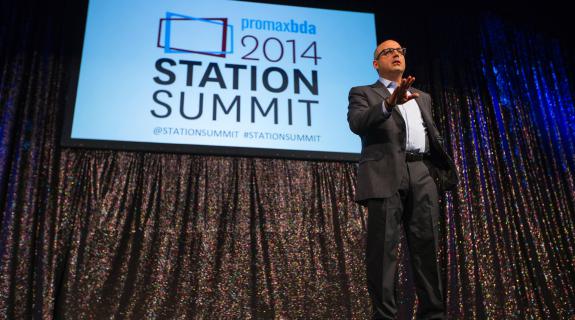While no one can predict the future, a few things are certain for broadcast TV outlets, host, author and consultant Shelly Palmer told an audience of creative service directors and marketers at PromaxBDA’s Station Summit on Tuesday, June 24.
“Sometime in the next 12-18 months, if you are a CW network affiliate more of your shows will be watched online than on broadcast,” said Palmer.
“Right after that – 24-36 months—it is a mathematical certainty that Fox Broadcasting Company will experience the same thing. More of its programming, if not all, will be watched online than on broadcast. ABC, CBS, NBC will follow age appropriately until at a point the broadcast television industry will be consumed more by other devices than on television. This won’t be true for sports, or 100% of the content, but it will be for the broadcast networks.”
So what does that mean for marketing and promotions people? How should promo teams who are used to driving tune-in via their own air and outside media buys such as cable and radio change their strategy?
“When this changes it will be dramatic to the way you guys see your day. I don’t know what a promo is now. What does a tune-in promo look like in this environment?” Palmer asked. “With respect to primetime programming, I’m either going to DVR it or binge-watch it on the weekend. What does it mean to promote something? Is it an event? Is it ‘I must be there?’ Making primetime a destination is really hard. Sports is easy, news is easy. If something really happens, people tend to figure that out.”
Moreover, this September Nielsen has said it’s going to start measuring “C3 mobile,” which means measuring the commercial ratings for all programming consumed live and through the next three days on mobile platforms.
Palmer is skeptical that Nielsen will actually get this done by September and done correctly: “I could do 2 ½ hours without stopping on why we are in measurement trouble and why we are going to stay in measurement trouble for a while. Measurement will be an absolute pain in our butts for the next 36 months,” he said.
Still, it’s long past time for stations to start thinking about how to promote to viewers who are consuming programming on mobile devices and how best to monetize that viewing. Many of those viewers—and especially Millennials, who represent $600 billion of purchasing power—only watch programming online and on their mobile devices and have never developed a traditional-TV habit.
“They behave nothing like anyone else you’ve dealt with,” Palmer said. “The purchasing power of that demographic is frighteningly large and they don’t behave anything like their parents. That’s happening faster than it’s ever happened.”
Palmer to Twitter: ‘Your platform sucks.’
While the audience pondered that notion, Palmer also stated that – the proliferation of hashtags aside – Twitter is a dwindling platform.
“Let’s talk about Twitter for a minute,” he said, standing next to a PromaxBDA banner with #stationsummit scrawled across it. “I was attending the Cannes Lion advertising conference last week and I was sitting with friends at Twitter, who asked me what their future will be. They said their audience development was not going according to plan. I was very amused by this.”
“They asked me what I thought the problem was and I said, ‘I don’t think it’s your audience development.’ ‘What do you mean?’ ‘Your product sucks,’ I responded.”
After having that bold conversation, Palmer went on to explain. Every TV network and TV show is plastering hashtags all over every newsroom, ticker and lower-third.
“‘The Today Show’ thinks you are so important that they built an orange room and they put Carson Daly in it and he reads Tweets off the screen. You guys probably have more media weight than the next 200 advertisers combined and if you can’t grow your audience with that behind you, then your product sucks.”
Instead of focusing on Twitter, Palmer advised marketers to “get really serious about Facebook, but Twitter, who cares, it’s just about talking to yourselves. Twitter is not the only social media tool. I get it. It’s the one your boss knows about. You fought for it, you got up in front of him and said, I need a budget, this is important.”
Going back to the future, Palmer exhorted attendees to immediately start thinking differently about how they do their jobs.
“Inside of a business cycle, all of you are going to have to rethink the world. It’s a mathematic certainty that we are going to be an over-the-top, mobile-first environment. Broadcast will be an additive tool. Is it a reach mechanism, is it a barker? How will communication be different on a 50-inch flat screen than on a 6-inch smart phone?
“This trend line is absolute. So what will you do? How will you go back to make a key takeaway actionable? We’re in a new set of technologies. Don’t ignore them, and don’t think they are going away. Don’t think tomorrow is going to be like today. “
Tags:













































__twocolumncontent.jpg)











